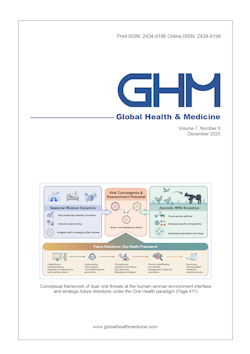Global Health & Medicine 2025;7(2):172-174.
A perspective on field epidemiology in Japan: Insights from human resource development in the Field Epidemiology Training Program
Sunagawa T
The establishment of the Center for Field Epidemic Intelligence, Research, and Professional Development (CFEIR) within the National Institute of Infectious Diseases (NIID) in 2021 marked a significant advancement in the country's epidemiological training capacity. Japan's Field Epidemiology Training Program (FETP), launched in 1999, has since trained 128 epidemiologists as of 2025, strengthening outbreak response efforts nationwide. The COVID-19 pandemic highlighted the acute shortage of field epidemiologists, emphasizing the need for FETP expansion and regional training initiatives. The introduction of the 1+1 training model and establishment of regional training spots in Osaka and Okinawa have diversified the participant base, increasing local outbreak response capacity. Since 1999, FETP trainees have been deployed to 419 outbreak investigations, including COVID-19, measles, food poisoning, and emerging infectious diseases. With the upcoming launch of the Japan Institute for Health Security (JIHS) in April 2025, efforts will focus on strengthening human resource development using field epidemiology and integrating applied epidemiology approaches such as One Health, disaster epidemiology, and risk communication. Strengthening international collaboration, particularly in the Western Pacific and Southeast Asia, remains a key priority. This paper underscores the evolving role of field epidemiology in Japan and the necessity of sustained investments in epidemiological training, digital tools, and global health partnerships to ensure preparedness for future pandemics.
DOI: 10.35772/ghm.2025.01023







